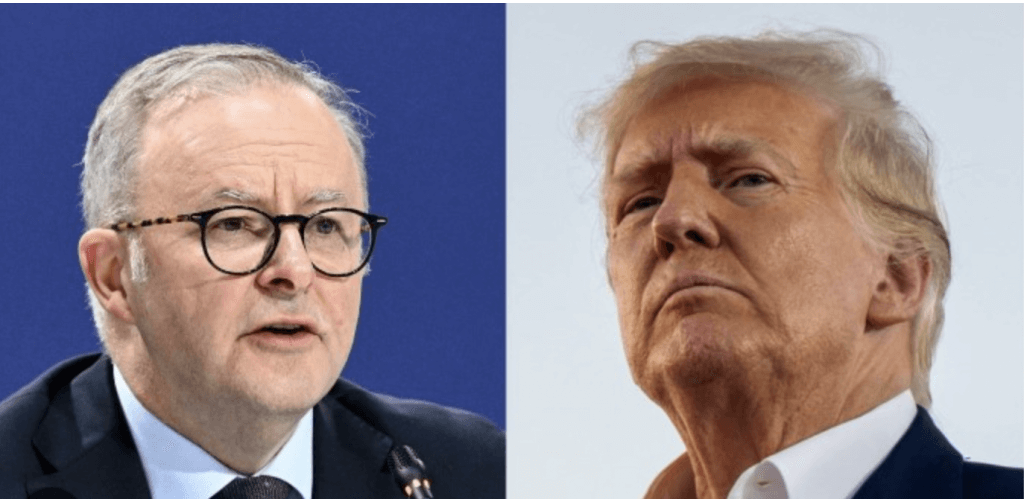
Image: LN24INT’
As the political landscape in the United States shifts following Donald Trump’s victory in the 2024 election, Australian Prime Minister Anthony Albanese has made his first official outreach to the former U.S. president, expressing his congratulations on the win. This comes amidst a flurry of diplomatic activity, including the sudden deletion of controversial comments made by Australia’s Ambassador to the U.S. following Trump’s victory.
In an apparent effort to solidify Australia’s diplomatic standing with the incoming administration, Albanese’s communication with Trump signals a pragmatic approach to future relations. Australia’s position in the global arena, particularly with regard to its security and economic ties with the United States, is pivotal, and Albanese is keen to ensure that Australia remains well-placed to benefit from a potential shift in U.S. foreign policy under Trump’s second term.
Ambassador’s Controversial Comments and Subsequent Deletion
The situation took an unexpected turn when Australia’s Ambassador to the United States, Caroline Kennedy, made remarks following Trump’s victory that quickly sparked backlash. In an online post, Kennedy appeared to question the legitimacy of the election results, alluding to the possibility that the U.S. might be on the verge of “political instability.”
The comments were seen by some as politically charged, and tensions flared as critics accused Kennedy of undermining the legitimacy of the U.S. electoral process. Within hours, the post was deleted, and Kennedy issued a statement clarifying her position, stating that she was “committed to maintaining the integrity and friendship of the U.S.-Australia relationship.”
The deletion of the comments, which was widely covered by the media, raised questions about the role of diplomats in maintaining neutrality during politically sensitive periods. It also illustrated the delicate balance Australian officials must strike in navigating U.S. domestic politics, particularly when the political climate is as volatile as it was during Trump’s campaign.
“As Ambassador, I remain focused on strengthening the partnership between our countries,” Kennedy said in her follow-up statement. “It is my duty to represent Australia’s interests and respect the democratic processes of our partners.”
The comments by Kennedy and the subsequent removal of her post created a stir, but they also underscored the unpredictable nature of U.S. politics and the challenges that foreign diplomats face in managing their public statements during times of political upheaval.
Australia’s diplomatic approach under a second Trump presidency is likely to be shaped by both continuity and change. While the U.S.-Australia alliance has remained strong for decades, the dynamics of the relationship could shift, especially in terms of trade and security policy.
During Trump’s first term, his administration took a more transactional approach to international relations, focusing on bilateral deals and challenging multilateral frameworks like the Paris Agreement and the World Trade Organization. His policies also emphasized greater military engagement in the Indo-Pacific, where Australia’s strategic interests are closely aligned with those of the U.S.
A second Trump term could see further emphasis on U.S. military power in the region, particularly in countering China’s growing influence in the South China Sea and beyond. Australia, which is heavily invested in maintaining peace and stability in the Indo-Pacific, may find itself deepening defense cooperation with the U.S., especially if Trump continues to prioritize strong alliances in the region.
“Australia’s security and economic prosperity are closely linked to the U.S., and under a second Trump administration, we may see an even more robust partnership in defense and trade,” said one Australian foreign policy expert. “However, Trump’s America First agenda could also lead to new challenges, particularly when it comes to trade tariffs and international cooperation on issues like climate change.”
Australia’s government, under Albanese, is likely to engage in early discussions with Trump’s team to ensure that Australian exports continue to enjoy preferential treatment under any future trade deals. The Albanese administration will likely seek to secure exemptions from any tariffs that may be imposed on key industries and ensure that Australia maintains its competitive edge in the U.S. market.
A New Chapter in U.S.-Australia Relations
As Donald Trump prepares for his second term, Australia’s leaders are taking a measured approach to the future of the bilateral relationship. While Albanese’s congratulations reflect a desire to maintain strong ties with the U.S., the deletion of Caroline Kennedy’s comments serves as a reminder of the complexities of diplomacy during a highly charged political time.
In the coming months, both the Australian government and U.S. officials will likely work to define the contours of their relationship under Trump’s leadership, ensuring that their shared priorities, especially in security and trade, remain at the forefront.
As the dust settles from the election, Australia will continue to play a crucial role in the U.S.-led international order, and the strength of the U.S.-Australia alliance will remain a key factor in navigating the geopolitical challenges of the coming decade.
Get the latest of our Loveworld News from our Johannesburg Stations and News Station South Africa,LN24SA
Related Posts
Some description text for this item
